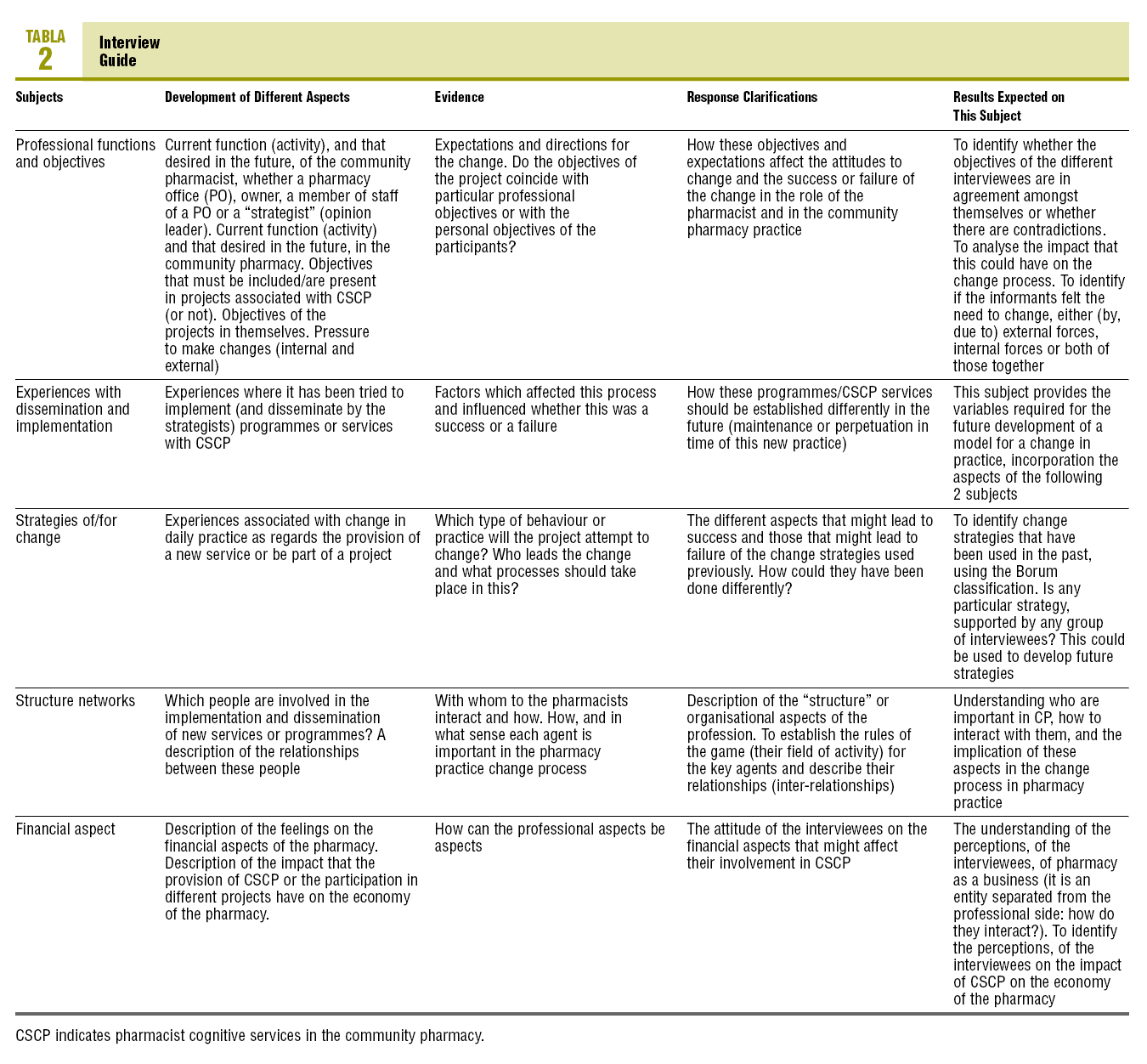Key Points
• Qualitative investigation methodology enables complex phenomena that occur in the health setting to be looked at in depth.
• Cognitive services in the community pharmacy could lead to a change in the collaboration with the doctors, which could affect patient care.
• Knowledge of the barriers to implementing cognitive services in community pharmacies allows possible solutions to be identified, which must be approached from different fronts.
• Research studies need to be carried out that will report not only the barriers that affect the implementation of cognitive services in community pharmacies, but also on their performance.
The answer is yes.
In the same way that the concept of primary care has been modernised, changes have been made to the concept of pharmaceutical care. This "new" concept widens the activity of dispensing treatment, to following these up, the performing of disease prevention tasks and the development of activities that will have an effect on the maintenance of the health of the population. The cognitive services referred to in the study by Gastelurriutia et al1 are included in the field of pharmaceutical care in community pharmacies.
The development of cognitive services in community pharmacies has been difficult due to several problems which are not exclusive to Spain, as they also arise in other countries. It has to be taken into account that the majority of publications on the subject of cognitive services have been in scientific journals in the field of pharmacology, which are not read by doctors. For this reason, it is important to note the study by Gastelurriutia et al1 in the area of primary care, since changes in pharmacy services also affect the work of the doctors.
It is worth taking the time to evaluate the situation of cognitive services in community pharmacies at an international level.
One example is in Sweden2 where pharmacy is organised using a governmental public model. Westerlund et al2 identified the lack of human resources, budget cuts and the need for organisation changes, as major problems in the implementation of cognitive services in pharmacies, as well as the adjustment the universities would have to make to the teaching aspects.
Also, similar difficulties were encountered in Canada,3 associated with the lack of human resources and financial payments for activities required for cognitive services in pharmacies.
As regards the United States, where the organisational model is predominantly private and where it is possible to obtain prescribed drugs in places other than pharmacies themselves, it seems that there is an increasing interest in the development of pharmacy cognitive services. In this context, it is an activity that is almost always financially reimbursed by private or public insurance.4
Before implementing services, it is necessary to establish if it is really worth the trouble, and what might be its clinical and economic impact.
While attempting to study the effect of cognitive services associated with diabetic patient education, the Ashville5 study demonstrated that the development of cognitive services by pharmacists in patients with diabetes mellitus improved the clinical results of these patients.
On the other hand, there are economic studies that predict that the balance of the effect of cognitive services in the pharmacy could be positive, the savings exceeding the investment required for them.6
The study by Gastelurriutia MA et al1 reflects the difficulties in providing cognitive services in the context of community pharmacies in Spain, from the perspective of the pharmacist. Reading this article enables us to reflect on the possibility that these services could offer, by achieving a closer collaboration between doctors and pharmacists.
As regards the methodology used, it has to be understood that the qualitative investigation allows the how and why of the phenomena to be studied in the actual context in which they occur. The use of qualitative investigation methodology is adequate for the objectives that the study by Gastelurriutia et al1 try to achieve, and it offers the possibility of looking in depth at the real barriers, which, once known, are the first steps in trying to improve the current situation. This study provides us with a concrete perspective, which is required to broaden the perspective of the other players involved, which are the users and other health professionals. It is also essential to develop further studies that will allow the impact of cognitive services in pharmacies to be evaluated in order to advise on the most worthwhile options in our context. It will continue being a challenge for pharmacists to establish the value of the services they can offer.4









